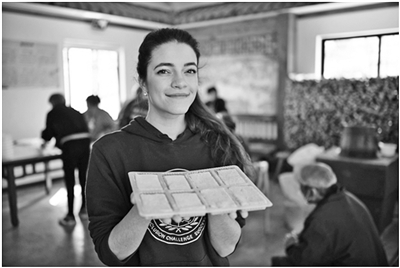
Marina got a chance to learn and experience how to prepare the dough.
On a sunny day of this Mid-March, Marina Albernaz from Brazil was invited by Ningbo Evening News to take a short cultural journey in Ningbo, China. After visiting the Dexinfang Art Gallery and the time-honored Wuji Bridge, Marina’s final stop was the Huchen Maci Cultural Experience Center, where she would get to taste a local delicacy called maci (green rice cakes).
Marina is currently working as a marketing coordinator at Georgia School Ningbo (GSN) and came to China three and a half years ago, growing fond of culinary trips around Chinese villages to explore their local culture and history. Ushering her into the Dexinfang Art Gallery, Bao Mingpei (gallery founder) introduced his artistic crafts with a three-meter-high traditional handmade hoop bucket. This bucket — one of his iconic items — is made of rosewood inserted with yak bones. To Marina, the drawings of 56 Chinese ethnic groups depicted around the bucket were vivid and impressive. Around the corner, a wooden octagonal jar caught her eye due to the eight engraved bats (homophones for happiness and good luck in Chinese) and eight different symbols of Chinese ancient gods that were carved on the Brazilian rosewood. With this type of food jars, people in earlier days stored snacks. Also, the gallery has a large collection of root carvings, mostly inspired by ancient Chinese myths and legends (e.g., The Lady Chang'e Flying to the Moon). It is revealed that Mr. Bao is also an intangible cultural inheritor of Chinese traditional handmade hoop buckets, having won the Shanhua Award (China's highest folk-art honor).
The second stop on Marina’s journey was the historical site of Wuji Bridge where she was amazed by the talent and creativity of ancient Chinese builders. This ancient construction was built in 1848 – during the Qing Dynasty – and is the longest pillar-shaped stone bridge in East Zhejiang. Among its components are three long stone strips juxtaposed to form a bridge deck (length: 137.5 meters, width: 1.65 meters, height: 2.65 meters). To reduce water resistance, ancient craftsmen chiseled the piers on the front side facing the water into circular prisms and added dozens of inclined supportive columns. For more than a century, the bridge has been standing, weather-worn but firm against floods.
The Huchen Maci Cultural Experience Center was her last stop. Here, Marina would taste the village’s traditional rice cake – known as maci – and learn its history and customs. This Chinese delicacy is made primarily of sticky rice and Chinese herbs, with brown and white sugars added and pine pollen placed on top. To eat maci is a Chinese custom during the Qingming Festival (15 days after the Spring Equinox, usually between April 3rd and 5th). Locals at Huchen Village eat a special version of maci (black rice cakes colored by leaves of vaccinium bracteatum) on the eighth day of the fourth Chinese lunar month to commemorate the birthday of the god of farm cattle and to appreciate its hard work. A group of food workers were making maci when Marina entered the center. They revealed that the entire process of making maci includes 18 steps. It starts with preparing two main ingredients (Chinese herbs and sticky rice); the green herbs are generally picked and sorted in the mornings and added to boiled water before being cut into tiny pieces. Then a fresh batch of steamed sticky rice and the green herbs are all added to a big stone mortar. These masters will continually use a huge stone to hammer pound the mixture into a sticky and wet dough. To her delight, Marina got a chance to learn and experience how to prepare the dough, which was then rolled and cut into small square portions. Pine pollen was placed on top before being packaged for delivery. Its pleasant aroma piqued Marina's appetite and keenness; although unfamiliar with the taste of Chinese herbs, this traditional snack was chewy with a slightly sweet aftertaste.
Marina’s journey was organized by Ningbo Evening News and offers expats in Ningbo a chance to learn about the history, culture, traditional food, and development of this Chinese city as a modern coastal metropolis. It is also hoped to promote friendly exchanges between expats in Ningbo and the rest of the world.
Reporters:
Mei Jie, Yu Qiaoran (Intern)
Proofreaders: Huang Dawang, Puyang Rong, Jason Mowbray


